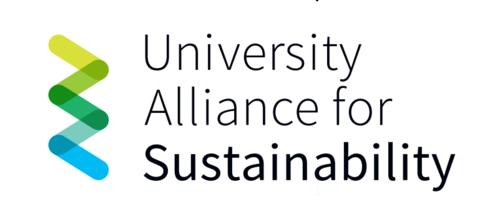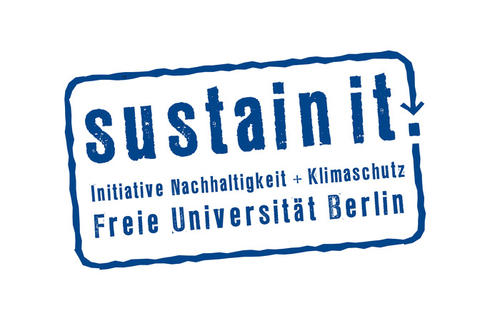Wildlife-Friendly Campus - A Project for Less Waste and Increased Awareness of Urban Nature
Only available in German: Presentation of the project "Wildlife-Friendly Campus - A Project for Less Waste and Increased Awareness of Urban Nature" during the FUturist Matinee on June 22, 2023.
The Idea Team
We are a team of three. Janet Wagner is a librarian with a Master's degree in Education for Sustainable Transformation, coordinates GreenFUBib – Sustainability at the University Library, and is involved in Blooming Campus and Blätterlaube. Leon Salisch is a prospective primary school teacher, coordinates the community garden Blätterlaube, and leads various projects in public relations and biodiversity-promoting area redesign, both on the FU campus and in urban green spaces. Rebecca Rongstock is a doctoral candidate in plant ecology, coordinates Blooming Campus, and leads projects in public relations and research on campus areas.
What connects us is our love for biodiversity in the city. We have experience in initiating projects and diverse connections at the Free University of Berlin.
About the Idea
With the increasing decline of biological diversity in urban spaces, people lack nature experiences and encounters. Blooming areas and wildlife on the campus of the Free University of Berlin should be protected and valued. Waste is generated anew every day. At a large university with over 37,000 students, ensuring environmentally conscious waste disposal in both indoor and outdoor areas of the campus is a challenge.
On the Dahlem campus, around the outdoor areas of the cafeterias (Mensa FU II, Otto-von-Simson-Str.26) and the Japan Mensa (Van’t-Hoff-Straße 6), there are two types of trash cans: for packaging waste and residual waste. The trash cans are completely open, have no lids, and are of low height. In the heavily frequented areas around the cafeterias, a lot of waste is generated daily, especially during the semesters: take-away packaging (plastic waste, composite materials) as well as packaging from surrounding bistros and restaurants (aluminum foil, styrofoam packaging, disposable plastic bags). Almost daily, you can observe how these packages are scattered on the sidewalks, meadows, and traffic areas of the FU.
Crows, martens, foxes, raccoons are wild animals that freely feed on the sometimes odorous packaging waste. Food residues are licked and gnawed. Styrofoam and foils are thus distributed on the campus areas. This way, packaging waste not only ends up on the university's green spaces but also in the stomachs of wild animals.
In the medium and long term, the trash cans on campus should be made more wildlife-safe. In addition, signs should curb the problem of "littering" (discarding & leaving waste). As part of the goals of the FU Climate Emergency Declaration, this is a visible measure addressing the environmental behavior of people who work, study, and spend time on the green spaces and outdoor areas of FU daily. In the long term, the areas of Blooming Campus should be freed from waste, and wildlife-safe trash cans should serve as a learning example for further installations of waste bins on the Düppel and Lankwitz campuses.
Conclusion and outlook
Overall, we note that we have not yet fully achieved our goals. There are several reasons for this, including the fact that the various types of trash cans on campus require custom manufacturing and two prototypes (at the FU II cafeteria and in front of the Japanese cafeteria Shokudō) are only sufficient to a limited extent for a meaningful study on the effectiveness of wildlife-friendly trash cans. Nevertheless, we have learned a lot in the course of our project implementation, e.g., about the complex littering behavior of people and how prevalent the issue already is in many cities, neighborhoods, and municipalities. The exchange with various nature conservation organizations, such as the German Wildlife Foundation and NABU, was particularly helpful.
The survey results for the further development of our pilot project are available from the Technical Department. In fall 2025, the wildlife-proof trash can was removed because the cover broke off and this type of trash can did not lead to a reduction in waste. Anyone who wants to see the existing model can find it in front of the Japanese cafeteria Shokudō.
Packaging waste, especially around cafeterias and seating areas, remains high. What you can do to reduce packaging waste:
- Shop unpackaged
- Reusable instead of disposable
- “To stay” instead of “to go”
- Bring your own food in reusable containers instead of using delivery services
- How to dispose of packaging waste correctly: the waste separation concept.
To create practical and timely solutions that curb the littering problem and protect wildlife from plastic and plastics! Addressing one's own behavior, throwing less waste into nature, or understanding the consequences of waste in the city is an important concern for us - not only for the Dahlem campus but generally, in the sense of environmentally friendly behavior of people throughout the city.
We hope that the experiences and insights gained from our project can also be used in the future, e.g., for further educational work and awareness-raising on the topic within the framework of the Student University, in workshops, as part of networking with other universities, or in exchanges with the district.
Contact
Rebecca Rongstock - r.rongstock@fu-berlin.de
Janet Wagner - Janet.Wagner@fu-berlin.de
Leon Salisch




